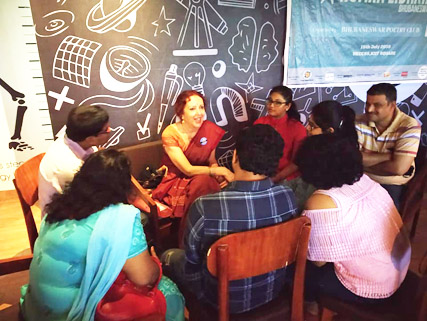Post News Network
Bhubaneswar: The ‘Bhubaneswar Poetry Club’(BPC) organised an event named The Human Library, July 15, for the first time in the city at the Café near Patia. Around 250 readers attended the storytelling by nine ‘human books’, who told tales of exemplary struggle and survival.
The Human Library provided a unique platform for the convergence of opinions about certain realities that we find difficult to address or talk about. It established a safe conversational place where difficult questions were appreciated and answered in order to promote understanding of social prejudices and increase tolerance among human beings.
Bijaya Samal of Bhubaneswar Poetry Club said The Human Library Project was conceptualised in Denmark in 2000 to provide an incubated environment for conversations. It created a ripple of hope in several cities of 66 countries, with Bhubaneswar being the sixth Indian city to host it.
A lot of efforts have gone into structuring the ideal categories of human books, searching for individuals whose stories can inspire, convincing the human books about this new concept, arranging sponsorships and scholarships, handling resources and pre-event promotions and planning the roadmap for execution, said Bijaya.
Dibyaswarupa Mohanty of BPC said at the event that readers were allowed to ‘borrow’ a human book for 20 minutes and listen to their perspectives. The books focussed on many human aspects.
Book 1, a bisexual, clinical depression survivor spoke about the general view people have of a person striving to fortify his/her mental health. Depression, accompanied by anxiety and tremors, strangles the insides of an individual impeding the will to go ahead.
Book 2, a hearing disabled female entrepreneur, inspired her readers with her spirit of striving against all odds and seamlessly breaking stereotypes to establish herself as an entrepreneur.
Book 3, an accomplished transgender, civil servant said, “I have never succumbed to the pressures of society or family, because I am a firm believer in my opinions. If I feel a certain way it is because it comes naturally to me and I am not going to deny that.”
She narrated about her struggles in childhood, adolescence and early years of college, where she found it difficult to fit into categories. But her faith in herself was strong and hence became successful in her civil service examination in the first attempt.
Book 4, the gay, sexual abuse survivor, engaged his readers with his insightful perspectives. He acknowledged the fact that he thought of his initial attraction to men as a phase that would pass, but later he convinced himself of his reality.
He feels grateful for the support he has been getting from his friends, but is yet to break the news to his parents, who he feels will eventually embrace him for who he is.
The alcohol abuse survivor, who was the fifth book had an invigorating narrative on his lifestyle during the phase in which he “woke up to alcohol and passed out due to its effect at night”. His friendly demeanour won him many admirers who were able to see the flipside of certain addictions.
The acid attack survivor, presented as Book 6, narrated the life changing assault in which she lost her vision and sustained 80 per cent burns due to the acid thrown at her when she turned down the proposal of a jawan. She traced her life where she finally met the love of her life who supported her in all endeavours and helped her to tide over adversities.
Book 7, a victim of caste discrimination, exemplifies the fact that society is increasingly tarnished by the subordination of intellect by institutions, experience to dogma and inward realisation to outer expression. The moral fibre has been crippling with the culture of impunity that emboldens voices to place the victim behind bars of accusations.
Book 8, an Italy-born Odissi dancer added flair to the human library with her charismatic persona and elegant charm. She said, “Dance can make you feel closer to a new culture. I have learnt everything through dance – the Odia language, wearing a saree, the food and charm to love and serve.”
Book 10, a former sex-worker and sexual abuse survivor’s interaction with her readers gave them goose bumps. From being happily married, to being subjected to marital rape, to taking up odd jobs to sustain herself and then finally being an escort for her livelihood, she has seen through all.
Her relationship with her daughter was also tarnished and she has been to the throes of hell. But in spite of all that she stood up stronger and is now working as a social worker for the welfare of the escorts’ community.
Ankit Sharman, a participant, said that it was his first experience attending this unique concept of considering the story of an individual from the perspective of a book.
